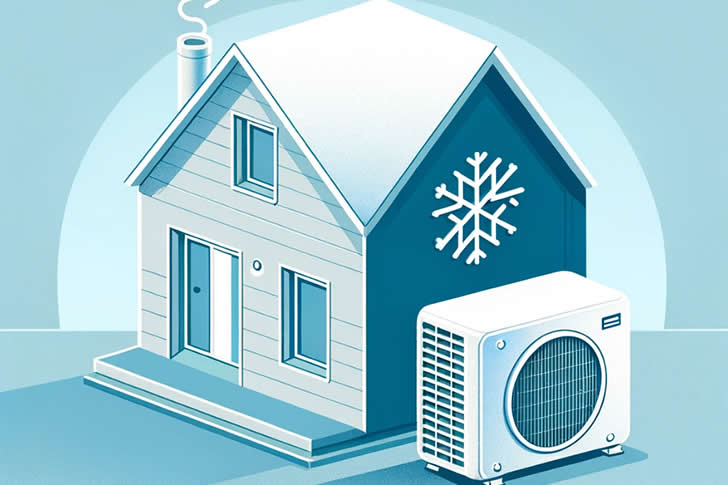Federal Tax Credits for Heat Pump Purchases
As awareness of environmental issues increases, so does the interest in energy-efficient technologies. One such technology that’s gaining popularity in American homes is the heat pump. Heat pumps offer an energy-efficient alternative to furnaces and air conditioners. To incentivize the adoption of these systems, the federal government offers various tax credits which can significantly reduce the cost of purchasing and installing heat pumps. Understanding these incentives can help homeowners make informed decisions while benefiting financially and contributing to environmental sustainability.

What is a Heat Pump?
Before diving into the specific tax credits available, it’s essential to understand what a heat pump is and how it works. A heat pump is a system that transfers heat from outside of a building to the inside (or vice versa), using less energy than it takes to generate new heat. In simple terms, during winter, it extracts heat from outdoor air, even in cold conditions, and moves it indoors. In summer, it reverses the process, acting like an air conditioner by removing heat from your home. This dual functionality makes it an attractive option for climate control in residential and commercial properties.
Federal Tax Credits for Heat Pumps
The U.S. federal government provides tax credits through the Inflation Reduction Act of 2022, aimed at reducing upfront costs of energy-efficient home improvements, including the purchase and installation of heat pumps. The specifics of these credits are vital for homeowners considering a heat pump investment.
For systems installed from January 1, 2023, to December 31, 2032, homeowners can avail themselves of a tax credit equal to 30% of the cost with no upper limit. This can include the cost of the heat pump units themselves and the necessary installation services. Importantly, both air source and ground source heat pumps are eligible, and the equipment needs to meet certain criteria set by ENERGY STAR for efficiency.
Economic Benefits of Heat Pump Installation
In monetary terms, investing in a heat pump can lead to significant savings, not just through tax credits but also by reducing monthly energy bills. Heat pumps are more energy-efficient than conventional heating and cooling systems, which translates directly into savings. For example, according to the U.S. Department of Energy, an efficient heat pump installation can save a homeowner anywhere from $300 to $1,500 annually on utility bills, depending on the climate and the type of system replaced.
With the additional 30% tax credit, the initial cost of purchasing and installing a heat pump becomes much more manageable. If a homeowner spends $10,000 on a new heat pump system, they can expect to get $3,000 back in tax credits. Therefore, the actual expense, not accounting for utility bill savings, drops down to $7,000.
Long-term Impact and Sustainability
Beyond the immediate financial savings and tax benefits, opting for a heat pump has far-reaching environmental and sustainability benefits. Heat pumps rely significantly on electricity and are incredibly efficient in transferring it into heat. This means that as the grid becomes greener and more renewable energy sources like solar and wind are employed, the overall carbon footprint associated with heating and cooling homes significantly decreases.
Moreover, updated technological advances and increasing market competitiveness are making heat pumps a feasible option even in colder regions, challenging the traditional reliance on fossil fuels for heating. As they gain popularity, the improved scale can further drive down costs and spur innovation in the sector.
Choosing the Right Heat Pump
For homeowners considering a heat pump, it’s crucial to select the right system that fits their specific needs. Factors such as climate, home insulation, and available space all play a part in choosing the most efficient and suitable heat pump model. Consulting with HVAC professionals and conducting energy audits can provide personalized insights into the most appropriate system.
Energy Star certified heat pumps are generally recommended, as these models meet strict energy efficiency guidelines set by the U.S. Environmental Protection Agency (EPA). Utilizing these models not only ensures eligibility for federal tax credits but also guarantees a level of efficiency that can lead to greater energy savings.
Conclusion
Investing in a heat pump is not only a wise decision economically but also environmentally. With the help of federal tax credits, the initial economic burden is mitigated significantly, making it an attractive option for many American households. By choosing an appropriate heat pump and capitalizing on these credits, homeowners can enjoy lower energy bills, a reduced carbon footprint, and a comfortable living environment year-round. Understanding and utilizing federal tax credits for heat pumps can lead to substantial long-term benefits, positioning heat pumps as a smart choice for future-proofing homes against energy cost fluctuations and environmental concerns.







Recent Comments